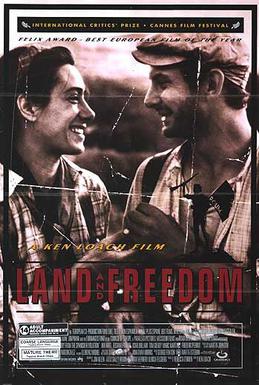"Land and Freedom was directed by Ken Loach (“The Wind That Shakes the Barley”). As usual, he is interested in political and
social commentary. In this case, he
takes on the Spanish Civil War. His
protagonist is a communist who travels to Spain to help create a better society. The movie was critically acclaimed and was
awarded the FIPRESCI International Critics Prize and the Prize of the
Ecumenical Jury at the 1995 Cannes Film Festival. The story is similar to George Orwell’s Homage
to Catalonia. Orwell participated in
the civil war as part of POUM.
The
movie is told in flashback as the granddaughter of David Carr (Ian Hart) looks
through his mementos after he dies. This is the framing device. She
discovers that he participated in the Spanish Civil War. Carr was a British communist who decided to
travel to Spain to join the rebels against Franco’s fascists. He joins a unit of the Workers’ Party of
Marxist Unification (POUM). The squad is
a mixture of genders and nationalities. He
quickly bonds with his mates as they all share a hard-core belief in Trotsky’s
version of communism. The situation is
complicated because POUM is at odds with the Soviet-supported communists who
are opposed to the radical social revolution that POUM wants. In the best scene, after the realistically
gritty capture of a village, the villagers debate whether to collectivize the
land. The villagers are played by actual
villagers from the location. Later, the
squad debates whether to join the popular army with its resources, or remain
pure. Carr bonds with his mates as they
deal with the frustrations of a losing cause.
He falls in love with one of the women.
The movie does a great job depicting the confusion of a civil war. There is a scene where Carr is on a rooftop
across from the other communist faction and he wonders why they are fighting
each other. This happens after Carr had switched
sides.
“Land
and Freedom” is an interesting movie, but it requires some effort on the part
of the viewer. It is a movie for intellectuals. Subtitles are rare and you have to figure out
the villager collectivization debate on your own. Thankfully, Carr speaks English so you do get
to rest a bit. Carr is an intriguing and
inspirational figure. He represents the
naivete of many revolutionaries. The framing
device is effective because we see his experiences and learn along with his
granddaughter about the situation he put himself in. His naivete and humaneness sets him apart
from most cinematic rebels who are hardened and Machiavellian. The other characters are appealing. They all share Carr’s sincere belief in the
cause. Carr develops a relationship with
one of the women, but the arc is not predictable. The unit is not dysfunctional. However, they do debate a lot. It is definitely a dialogue-driven
movie. Unfortunately, without the
subtitles, it can sometimes be difficult to figure out what they are saying. The movie can be a bit confusing. It could have been worse because at least it
does not try to give us the big picture. Just go with the flow and stick around
for some nifty action scenes. Civil wars
can be messy and this is clear from the movie.
For instance, a priest is executed.
“Land
and Freedom” is not based on a true story, but it does get the factionalism of
the war accurate. Aragon was a region
that was divided between the fascists and republicans. The fighting was basically guerrilla warfare. The republicans were divided into factions
with POUM being one of them. In 1937,
the government-backed Stalinists did take on POUM in Barcelona. POUM was driven underground after this.
“Land
and Freedom” is one of the better Spanish Civil War movies. You should see at least one, but you might
want to start with one that is not selectively subtitled. Try “For Whom the Bell Tolls” to get your
feet wet.

No comments:
Post a Comment
Please fell free to comment. I would love to hear what you think and will respond.